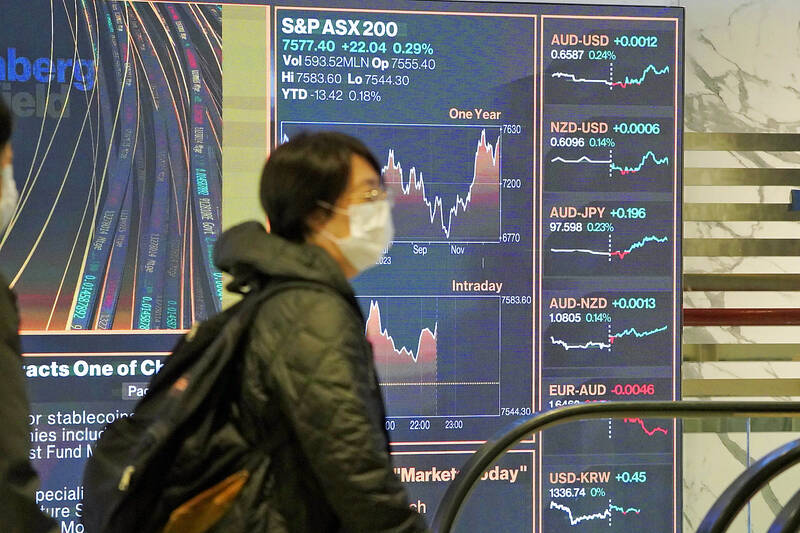The consumer confidence index this month rose 2.08 points to a 22-month high of 72.14, with all six components gaining value, as rallies in the local bourse helped boost overall confidence, a National Central University survey found yesterday.
The confidence measure moved up for the fourth straight month, aided mainly by a 5.54 point
elevation in stock investment to a four-year high of 58.68, said Dachrahn Wu (吳大任), director of the university’s Research Center for Taiwan Economic Development, which conducted the survey.

Photo: CNA
“The overall confidence reading has recouped to the level before the Russia-Ukraine War in February 2022, while the investment sentiment returning to the pre-pandemic era,” Wu said, adding that the TAIEX is benefiting from capital inflows seeking to take advantage of a tech cycle recovery.
The sentiment uptick also had to do with the prevalent expectation that Taiwan’s economy would come out of the woods following several quarters of technology inventory adjustments that have weighed on exports and private investment, he said.
The TAIEX had a poor beginning this month, but staged a turnaround after Taiwan Semiconductor
Manufacturing Co (TSMC, 台積電), the world’s largest chipmaker, delivered stronger-than-expected fourth-quarter earnings and forecast an up to 25 percent increase in revenue for this year, Wu said.
Expectations that the US Federal Reserve would cut interest rates later this year help to bolster shares in emerging markets, he said.
The TAIEX rallies not only create a positive wealth effect, but also fuel optimism about the economy and job market, he said.
Taiwan’s exports are generally expected to resume the role of growth driver this year after taking a hit from sharp global inflation and interest rate hikes, Wu said, adding that the service sector would continue to enjoy robust business.
That explained why the gauge on jobhunting in the coming six months grew 1.92 points to a 2.5-year high of 69.24, while the measures on household income and economic outlook rose 1.85 points and 1.61 points each to a 1.6-year peak of 78.5 and 82.94 respectively, the survey said.
The wealth effect and a stable job market bode well for people’s willingness to purchase durable goods, as the component edged up 0.15 points to 112.08 points, it said.
Confidence scores of 100 or higher indicate optimism and values lower than neutral suggest pessimism, it said.
Furthermore, the sub-index on consumer price movements in the next six months printed 31.37, a mild increase of 1.41 points from one month earlier, indicating that the public is less concerned about inflationary pressures, Wu said.
The university said it arrived at the observations after interviewing 2,984 adults by telephone between Jan. 18 and 21.

Taiwan’s rapidly aging population is fueling a sharp increase in homes occupied solely by elderly people, a trend that is reshaping the nation’s housing market and social fabric, real-estate brokers said yesterday. About 850,000 residences were occupied by elderly people in the first quarter, including 655,000 that housed only one resident, the Ministry of the Interior said. The figures have nearly doubled from a decade earlier, Great Home Realty Co (大家房屋) said, as people aged 65 and older now make up 20.8 percent of the population. “The so-called silver tsunami represents more than just a demographic shift — it could fundamentally redefine the

Businesses across the global semiconductor supply chain are bracing themselves for disruptions from an escalating trade war, after China imposed curbs on rare earth mineral exports and the US responded with additional tariffs and restrictions on software sales to the Asian nation. China’s restrictions, the most targeted move yet to limit supplies of rare earth materials, represent the first major attempt by Beijing to exercise long-arm jurisdiction over foreign companies to target the semiconductor industry, threatening to stall the chips powering the artificial intelligence (AI) boom. They prompted US President Donald Trump on Friday to announce that he would impose an additional

China Airlines Ltd (CAL, 中華航空) said it expects peak season effects in the fourth quarter to continue to boost demand for passenger flights and cargo services, after reporting its second-highest-ever September sales on Monday. The carrier said it posted NT$15.88 billion (US$517 million) in consolidated sales last month, trailing only September last year’s NT$16.01 billion. Last month, CAL generated NT$8.77 billion from its passenger flights and NT$5.37 billion from cargo services, it said. In the first nine months of this year, the carrier posted NT$154.93 billion in cumulative sales, up 2.62 percent from a year earlier, marking the second-highest level for the January-September

Asian e-commerce giant Shein’s (希音) decision to set up shop in a historic Parisian department store has ruffled feathers in the fashion capital. Anger has been boiling since Shein announced last week that it would open its first permanent physical store next month at BHV Marais, an iconic building that has stood across from Paris City Hall since 1856. The move prompted some French brands to announce they would leave BHV Marais, but the department store had already been losing tenants over late payments. Aime cosmetics line cofounder Mathilde Lacombe, whose brand was among those that decided to leave following